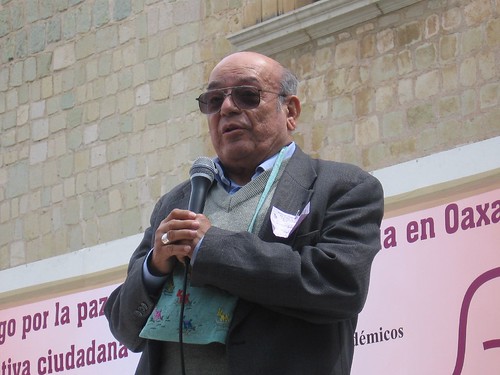Remembering Bishop Samuel Ruiz Garcia
Don Samuel: Peacemaker and Defender of the Poor
By Johann Christoph Arnold

At a time when violence and injustice are making headlines every day, the death of Bishop Samuel Ruiz Garcia, Mexico’s champion of the poor, on January 24 has turned my thoughts to the task that consumed him for decades and ought to concern everyone who calls himself a Christian: the task of being a peacemaker in a world gone mad with war.
Nicknamed the “Red Bishop” by his critics in the Vatican, and denounced as a “communist agitator” by the Mexican government, he was revered as “Tatic” (Mayan for “father”) by the thousands of Indians he served in Chiapas, the country’s poorest state.
The contrast in viewpoints is not surprising. From 1960 to 2000, when he retired, Don Samuel fought tirelessly for the rights of indigenous campesinos: for the laborers who returned from the fields with whip marks on their backs, for the women who were degraded by their bosses because they were Indians; for the children who would never learn to read, if they survived infancy.
A gentle, unassuming man, Don Samuel was known for riding a mule to visit mountain villages, and loved for his ability to speak four Mayan languages. At the same time, he was a thorn in the flesh to the region’s landed gentry. In 1994, when an armed uprising of Zapatistas turned the spotlight of the global media on Chiapas, he was accused of inciting class warfare.
The fact of the matter was that Don Samuel was a peacemaker, something the government itself later acknowledged by choosing him to help resolve its conflict with the rebels. He did this by serving as a mediator for several years, and was instrumental in moderating a nonviolent solution
By the time of his death on January 24, he had been nominated for the Nobel Peace Prize by at least five of its best known laureates. He was also praised by no less than Mexico’s President Felipe Calderon, who said his death was “a great loss for the country,” and U.S. Secretary of State Hillary Clinton, who said we should “honor his legacy and follow his example.”
The Bishop would have smiled. A friend of Oscar Romero, he knew that if the way of peace is honorable, it can also be lonely and dangerous. He himself endured numerous death threats, and narrowly escaped two attempts on his life.
Nicknamed the “Red Bishop” by his critics in the Vatican, and denounced as a “communist agitator” by the Mexican government, he was revered as “Tatic” (Mayan for “father”) by the thousands of Indians he served in Chiapas, the country’s poorest state.
I met Don Samuel in December 1997, just weeks after these incidents, and I’ll never forget the hours we spent talking together. To meet Don Samuel was to meet a man of God—a man who admitted that he had not chosen his job, but was placed there by his church and wanted to carry out the task given him. He had a sense of humor, too, telling me, “I came down here to convert the people, but they actually converted me… We are so blessed in Chiapas, because Jesus is all around us, in the poor.”
I asked Bishop Ruiz about concerns that he “mixed religion with politics.” He assured me that all he had ever tried to do was listen to the cries of the poor, and answer them as Jesus calls us to. “If we see Christ in the poor,” he said, “and work with them for the common good of society, then we are doing God’s work.” If, on the other hand, we turn a blind eye to oppression, we are “participating in a society that is completely opposed to the kingdom of God.”
That, in a nutshell, was Don Samuel’s “theology.” He knew that when all is said and done, peace is real only if it gives birth to justice. As the Letter of James puts it, “What good is it, my brothers and sisters, if you say you have faith, but do not have works? Can faith save you? If a brother or sister is naked and lacks daily food and you say to them, ‘Go in peace, keep warm, and eat your fill’ and yet do not supply their bodily needs, what is the good of that?”
Don Samuel lived his life in answer to this question. To quote more of what he said during my meeting with him:
The kingdom of God, which is the kingdom of peace, is also a kingdom of justice, truth, and love. That is why true peace demands a completely new social order…why it demands a new brotherly relationship among all people.
Christ said that he brought peace “not as the world gives”—he brought a different peace. In today’s society, that peace can be conceived only on the basis of justice. This is why Jesus urges us to stand with the poor and oppressed, with the prisoners and the sick. It is why he says, “Blessed are the peacemakers.”
Peace is a gift from God. Christ said, “I give it to you.” But it is also a task; it is work. It is not a question of doctrine, but of practice… At the end I will not be asked whether I made mistakes. I will be asked whether or not I loved my brother.
Don Samuel is gone. He has fought the good fight, and will surely receive the blessing promised to the peacemaker. But for you and me, the challenge remains. Because the question of brotherly love cannot just be answered by words or good intentions. It must be answered with deeds—today and every day.
Johann Christoph Arnold’s books are available at www.plough.com.
